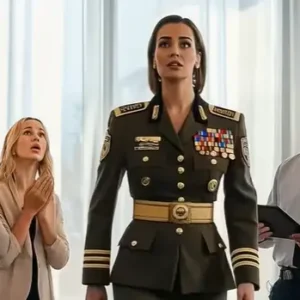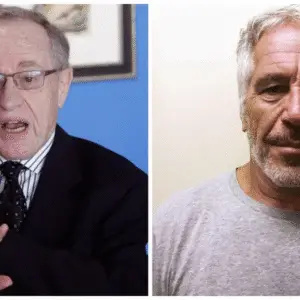The November rain had turned Riverside Cemetery into a landscape of muted grays when Victoria Blackwood first saw her. Through the steady drizzle, a young woman knelt beside Adrian’s headstone, her restaurant uniform dark with moisture, holding the hand of a small boy who couldn’t have been older than four.
Victoria paused on the gravel path, her umbrella forgotten as she watched the scene unfold. The woman was speaking softly to the child, pointing to the engraved dates on the marble stone. The boy nodded solemnly, placing a handful of dandelions he’d picked from somewhere onto the grave.
At fifty-five, Victoria had visited this cemetery every month for three years, since the car accident that claimed her only son’s life. She knew every regular visitor, every groundskeeper, every detail of the memorial garden. She had never seen these two before.
“Excuse me,” Victoria called out, approaching with the measured steps of someone accustomed to commanding attention. “I don’t mean to intrude, but this is my son’s grave.”
The young woman looked up, revealing a face marked by genuine grief rather than the casual curiosity of a stranger. She was perhaps twenty-six, with intelligent eyes that held a wariness Victoria recognized from her own boardroom experiences.
“I’m sorry,” the woman said, rising slowly while keeping hold of the boy’s hand. “I’m Jasmine Washington. This is Tyler.” She gestured to the child, who was staring at Victoria with startling green eyes. “We come here sometimes to remember Adrian.”
Victoria felt her world shift slightly. Adrian had been twenty-eight when he died, old enough to have relationships she might not have known about. But she had been thorough in her grief, investigating every aspect of his life, searching for meaning in his loss. There had been no mention of a Jasmine Washington.
“How did you know my son?” Victoria asked, studying the boy whose features seemed familiar in a way that made her chest tighten.
Jasmine hesitated, glancing down at Tyler before meeting Victoria’s gaze. “Adrian and I were friends in college. We… we stayed in touch over the years.”
There was something carefully measured in Jasmine’s response, the kind of precise wording Victoria had learned to recognize in business negotiations when someone was choosing their words very deliberately.
“And the boy?” Victoria asked.
“Tyler is my son,” Jasmine said simply, but her hand tightened protectively on the child’s shoulder.
Victoria looked more closely at Tyler, noting the shape of his eyes, the way he tilted his head when listening – gestures that reminded her powerfully of Adrian as a child. The resemblance was subtle but unmistakable to someone who had raised Adrian from birth.
“I see,” Victoria said, though she didn’t see at all. “I wasn’t aware Adrian had maintained close friendships from college.”
“There were many things about Adrian’s life that might surprise you,” Jasmine replied gently, but with an undertone that suggested she knew more about the complicated relationship between mother and son than Victoria was comfortable with.
The rain began to fall harder, and Jasmine gathered Tyler closer. “We should go,” she said. “Come on, sweetie. Say goodbye to Adrian.”
Tyler waved solemnly at the headstone. “Bye, Daddy Adrian,” he said in the clear voice of a four-year-old.
Victoria felt the breath leave her lungs. The casual intimacy of the goodbye, the way Tyler spoke Adrian’s name with familiarity, the timing of his age – it all pointed to a possibility she hadn’t considered.
“Wait,” Victoria called out as Jasmine began to lead Tyler away. “Please. Could we… could we talk sometime? Perhaps over coffee?”
Jasmine studied Victoria’s face for a long moment. “I work at Murphy’s Diner on Fifth Street,” she said finally. “Most afternoons.”
After they left, Victoria remained by Adrian’s grave for another hour, questions multiplying in her mind. She had spent three years believing she understood her son’s life completely. Now she was beginning to suspect there were chapters of his story she had never read.
The next day, Victoria found herself at Murphy’s Diner, a modest establishment she had driven past countless times but never entered. The lunch rush was ending, and she spotted Jasmine immediately, efficiently clearing tables while maintaining friendly conversation with the regular customers.
Victoria chose a booth in Jasmine’s section and waited. When Jasmine approached with a menu, her expression was polite but guarded.
“Mrs. Blackwood,” Jasmine said. “I wasn’t sure you’d actually come.”
“I have questions,” Victoria said simply. “And I think you have answers.”
Jasmine poured coffee without being asked, a gesture born of professional habit. “What would you like to know?”
“Is Tyler Adrian’s son?”
The directness of the question seemed to catch Jasmine off guard. She glanced around the diner, then sat down across from Victoria – a breach of restaurant protocol that spoke to the gravity of the conversation.
“Yes,” Jasmine said quietly. “He is.”
Victoria absorbed this confirmation, feeling a complex mix of grief, joy, and confusion. “Why didn’t Adrian tell me he had a child?”
Jasmine’s expression softened with something that might have been sympathy. “Mrs. Blackwood, when was the last time you and Adrian had a real conversation? Not about business or expectations or disappointments, but an actual conversation about his life?”
The question hit harder than Victoria had expected. She tried to remember meaningful exchanges with her son in his final years, conversations that went beyond her attempts to involve him in Blackwood Industries or his polite deflections of her suggestions.
“Adrian felt that you saw him as an extension of your business rather than as a person,” Jasmine continued gently. “He was afraid that if you knew about Tyler, you would try to control that relationship the same way you tried to control everything else in his life.”
Victoria wanted to protest, to defend herself, but the words felt hollow before she could speak them. She thought of the boarding schools, the summer programs, the carefully planned activities designed to prepare Adrian for leadership – all chosen without consulting him about his own interests or desires.
“He talked about me?” Victoria asked, her voice smaller than she intended.
“Often,” Jasmine said. “He loved you, Mrs. Blackwood. But he also felt that you had never really seen him for who he was, only for who you wanted him to become.”
Tyler appeared at the edge of the booth, having been coloring at a nearby table while Jasmine worked. He looked curiously at Victoria, then climbed onto the seat beside Jasmine with the casual confidence of a child who spent time in the restaurant.
“Tyler, this is Mrs. Blackwood,” Jasmine said. “She was Adrian’s mother.”
“You’re my grandma?” Tyler asked with the directness that only children possess.
Victoria felt tears threatening for the first time in years. “I suppose I am,” she managed.
Tyler studied her seriously. “Adrian said his mom was very smart but sometimes forgot that being smart isn’t the same as being happy.”
The observation, clearly repeated from something Adrian had said, cut through Victoria’s defenses completely. She realized that her son had understood her better than she had ever understood him.
Over the following weeks, Victoria found herself returning to Murphy’s Diner regularly. Initially, she told herself it was to learn more about Tyler, to understand this unexpected grandson. But gradually, she began to see that her visits were as much about understanding Adrian – and herself – as they were about getting to know the boy.
Jasmine was cautious but not unkind, answering Victoria’s questions about Tyler’s routine, his personality, his needs. She had been caring for him since Adrian’s death, she explained, having been named as his guardian in Adrian’s will.
“There was no mother listed on the birth certificate,” Jasmine said one afternoon when Victoria asked about Tyler’s biological mother. “Adrian handled the legal arrangements privately.”
Victoria sensed there was more to this story, but she didn’t push. She was learning, slowly, that relationships couldn’t be managed like business transactions. Trust had to be earned, not demanded.
She began bringing small gifts for Tyler – not the expensive toys she might once have chosen, but books and art supplies that Jasmine mentioned he enjoyed. She learned that he was bright and curious, that he loved stories about animals, and that he had Adrian’s thoughtful way of processing new information.
“Can I ask you something?” Jasmine said one day as Tyler played with blocks nearby. “What do you want from this? From knowing Tyler?”
Victoria considered the question carefully. A month ago, she might have answered with plans for Tyler’s education, his future, the opportunities she could provide. Now, watching him build an elaborate castle while narrating an adventure story to himself, she realized her answer had changed.
“I want to be his grandmother,” she said simply. “Not the person who manages his life or plans his future, but someone who loves him and supports whatever person he chooses to become.”
Jasmine studied Victoria’s face. “Adrian would be glad to hear that,” she said finally.
“Would he?” Victoria asked. “Really?”
“He used to say that he wished you could see people as they are rather than as potential projects to improve,” Jasmine said. “But he also said he understood that your need to control came from wanting to protect the people you cared about.”
Victoria felt the weight of years of misunderstanding settling on her shoulders. “I did want to protect him,” she said. “But I suppose I forgot to ask what he needed protection from.”
“He didn’t need protection from failure or disappointment,” Jasmine said gently. “He needed protection from never being allowed to be himself.”
That evening, Victoria sat in her study surrounded by photographs of Adrian at various stages of his life. In every picture, he was dressed appropriately, positioned correctly, smiling politely. She realized with growing dismay that she had very few photos of him simply being happy, caught in unguarded moments of genuine joy.
She thought about Tyler’s easy laughter, the way he shared his observations about the world without fear of judgment, his comfort with being exactly who he was at four years old. She wondered if Adrian had ever felt that kind of freedom.
The next day, Victoria made a decision that would have shocked her business associates. Instead of trying to establish legal rights to Tyler or making plans for his future, she simply asked Jasmine if she could spend more time with him – not as his grandmother asserting her position, but as someone hoping to earn a place in his life.
“I’d like to learn how to be the kind of grandmother Adrian would have wanted Tyler to have,” she said.
Jasmine smiled for the first time since Victoria had met her. “I think that’s exactly what he would have wanted,” she said.
Over the following months, Victoria discovered aspects of herself she had forgotten existed. She learned to play simple games without educational objectives, to read stories with funny voices, to answer Tyler’s endless questions without turning each one into a teachable moment.
She also learned about Jasmine – that she was taking evening classes in business administration, that she had grown up in foster care and was determined to provide Tyler with the stability she had never had, that she possessed a quiet strength and integrity that reminded Victoria of the person she had been before business success became her primary identity.
“Why don’t you ask me for money?” Victoria asked one day. “Most people in your situation would have approached me with requests for financial support.”
“Because Tyler isn’t a situation to be solved with money,” Jasmine replied. “He’s a little boy who needs love and consistency. I can provide those things.”
“But you’re working two jobs to support him,” Victoria pointed out. “You’re exhausting yourself.”
“I’m providing for my son,” Jasmine corrected. “There’s a difference.”
Victoria began to understand that her assumptions about what Tyler needed – and what Jasmine wanted – were products of her own worldview rather than accurate assessments of their actual circumstances.
One afternoon, as Victoria watched Tyler carefully color a picture he planned to give to Jasmine, she realized that this small boy was teaching her lessons she had never learned in decades of business success. He was showing her the difference between providing for someone and caring for them, between managing a relationship and nurturing it.
“Grandma Victoria,” Tyler said, looking up from his coloring, “do you think Adrian watches us sometimes?”
Victoria felt her throat tighten. “I hope so,” she said honestly. “I think he would be very proud of the person you’re becoming.”
“And proud of you too,” Tyler added with the generous certainty of childhood.
Victoria realized that for the first time since Adrian’s death, she was beginning to believe that might be true. Not because of her accomplishments or her success, but because she was finally learning to love someone without trying to change them.
As the seasons changed, Victoria found her relationship with both Tyler and Jasmine deepening in ways she had never expected. She discovered that being a grandmother was nothing like being a CEO – it required patience instead of decisiveness, presence instead of productivity, acceptance instead of improvement.
She also began to uncover more about Adrian’s life in his final years. Through Jasmine’s careful sharing of memories, Victoria learned that her son had been working on a novel, that he had volunteered at a literacy program, that he had found joy in simple pleasures she had never thought to ask about.
“He was planning to tell you about Tyler,” Jasmine said one day. “He wanted to wait until Tyler was old enough to understand the family dynamics, but he was going to introduce you.”
“What changed his mind?” Victoria asked, though she suspected she already knew the answer.
“He was waiting for you to change,” Jasmine said gently. “He wanted to believe that you could love Tyler without trying to reshape him into your vision of what a Blackwood should be.”
Victoria understood that Adrian’s death had robbed them all of the chance for that conversation, but it had also given her an unexpected opportunity to become the person he had hoped she could be.
Six months after their first meeting at the cemetery, Victoria made a proposal that surprised everyone, including herself.
“I’d like to establish a trust fund for Tyler’s education,” she told Jasmine. “But I want you to control it completely. You’ll decide how and when it’s used, based on what Tyler actually wants and needs, not what I think would be best for him.”
Jasmine looked stunned. “You’re willing to give up that kind of control?”
“I’m learning that the best gift I can give Tyler is the freedom to become whoever he’s meant to be,” Victoria said. “Adrian never had that freedom, and I don’t want to make the same mistake twice.”
As Tyler grew older, Victoria watched him develop into a confident, creative child who felt secure in being loved for exactly who he was. She learned to celebrate his interests even when they didn’t align with her expectations, to support his curiosities even when they led in directions she wouldn’t have chosen.
She also developed a genuine friendship with Jasmine, built on mutual respect and shared commitment to Tyler’s wellbeing. She learned to value Jasmine’s perspective, to defer to her judgment about Tyler’s needs, and to appreciate the wisdom that came from actually living with and caring for a child rather than simply planning for their future.
Three years after their first meeting, Victoria realized that Tyler had given her something she had never expected to find: the chance to understand what Adrian had needed from her, and the opportunity to finally provide it, even if only indirectly.
Standing in the same cemetery where their story began, Victoria watched Tyler place fresh flowers on Adrian’s grave while chattering about his upcoming kindergarten graduation. Jasmine stood beside her, no longer wary but genuinely comfortable in their shared role as Tyler’s family.
“Do you think Adrian would approve of how things turned out?” Victoria asked.
Jasmine smiled, watching Tyler’s animated conversation with his father’s headstone. “I think he’d be amazed that his son has two mothers and a grandmother who all love him without trying to change him,” she said. “That’s more family than Adrian ever thought Tyler would have.”
Victoria nodded, understanding finally that love wasn’t about molding people into better versions of themselves, but about creating space for them to become who they already were. It had taken losing her son to learn how to be the mother he had needed, but perhaps learning it now would make her the grandmother Tyler deserved.
As they walked back toward the car, Tyler between them, Victoria felt a sense of peace she had never experienced in all her years of business success. She had discovered that the most important acquisitions couldn’t be purchased, the most valuable relationships couldn’t be managed, and the greatest legacy she could leave wasn’t measured in dollars but in the simple act of loving someone without conditions.
Tyler skipped ahead, then turned back to wait for them, his green eyes bright with the confidence that came from knowing he was unconditionally loved. In his face, Victoria could see traces of Adrian, but more importantly, she could see Tyler himself – unique, precious, and free to become exactly who he was meant to be.
It was, she realized, the inheritance Adrian had always intended to give his son: not money or status or carefully planned opportunities, but the simple, revolutionary gift of being loved for exactly who he was.

Ethan Blake is a skilled Creative Content Specialist with a talent for crafting engaging and thought-provoking narratives. With a strong background in storytelling and digital content creation, Ethan brings a unique perspective to his role at TheArchivists, where he curates and produces captivating content for a global audience.
Ethan holds a degree in Communications from Zurich University, where he developed his expertise in storytelling, media strategy, and audience engagement. Known for his ability to blend creativity with analytical precision, he excels at creating content that not only entertains but also connects deeply with readers.
At TheArchivists, Ethan specializes in uncovering compelling stories that reflect a wide range of human experiences. His work is celebrated for its authenticity, creativity, and ability to spark meaningful conversations, earning him recognition among peers and readers alike.
Passionate about the art of storytelling, Ethan enjoys exploring themes of culture, history, and personal growth, aiming to inspire and inform with every piece he creates. Dedicated to making a lasting impact, Ethan continues to push boundaries in the ever-evolving world of digital content.





